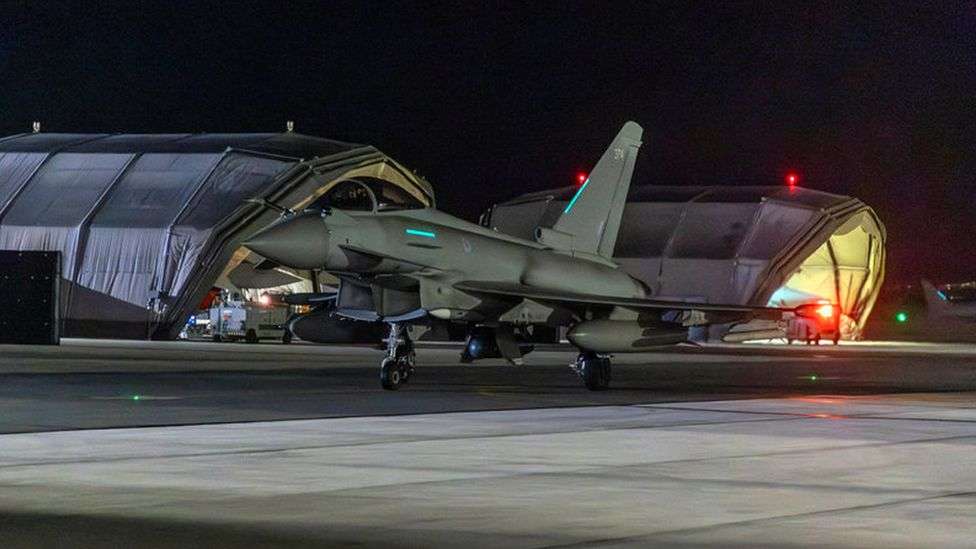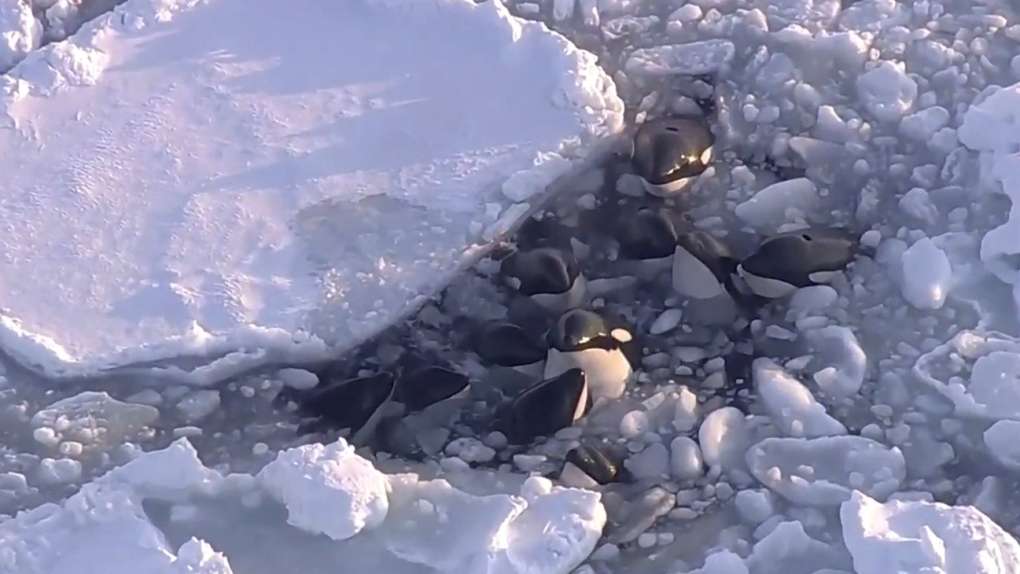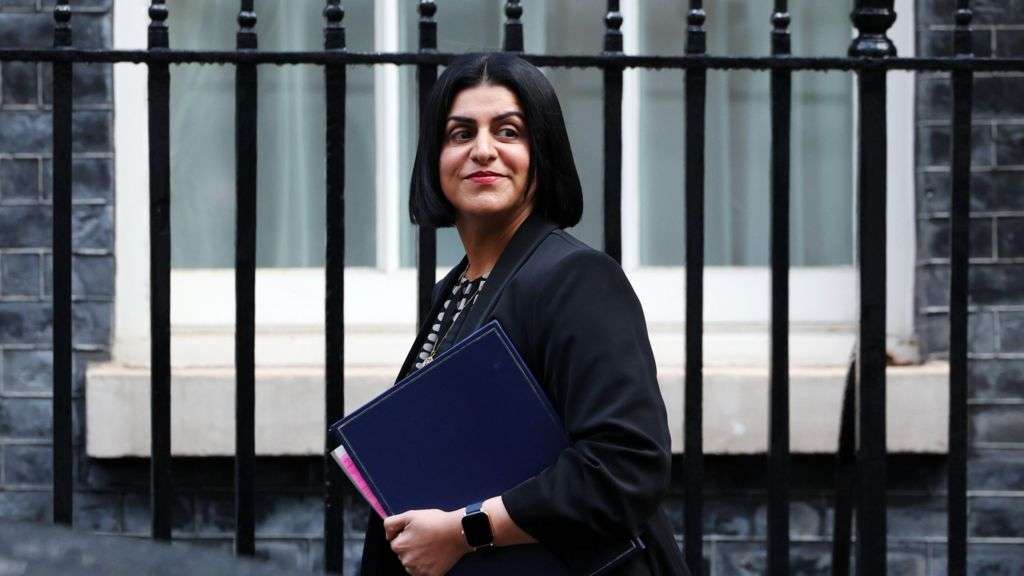Strikes against Houthi rebel sites in Yemen are "necessary and proportionate" to protect the global shipping in the Red Sea, Rishi Sunak has said.
The UK and US launched targeted strikes on military facilities overnight.
Mr Sunak said the action against the Iranian-backed group, who he accuses of threatening UK ships, was in "self-defence".
In response, Houthi officials have warned the UK and US will "pay a heavy price".
The US-led strikes are the first against the Houthi militia since it started targeting international shipping in the Red Sea last year.
The Houthi movement is a political and military group which controls a large part of Yemen and says it is supporting Hamas by targeting ships heading to Israel.
More than 60 targets at 16 locations used by Houthis in Yemen were struck, the US Air Force said.
Speaking early on Friday morning, Mr Sunak accused the Houthi movement of threatening UK and international ships and causing major disruption to the trade route.
"Despite the repeated warnings from the international community, the Houthis have continued to carry out attacks in the Red Sea, including against UK and US warships just this week, " the prime minister said.
"This cannot stand. The United Kingdom will always stand up for freedom of navigation and the free flow of trade."
He added that the UK had "taken limited, necessary and proportionate action in self-defence, alongside the United States with non-operational support from the Netherlands, Canada and Bahrain".
The aim of the action was "to degrade Houthi military capabilities and protect global shipping", Mr Sunak said.
The Ministry of Defence (MoD) said the Royal Air Force typhoons conducted two precision strikes on Houthi sites, including an airfield used to launch drones and missiles over the Red Sea and another site used to launch attack drones.
"The detailed results of the strikes are being assessed, but early indications are that the Houthis' ability to threaten merchant shipping has taken a blow," the MoD added.
'Limited... necessary'
Armed Forces Minister James Heappey said there were no further air strikes "immediately planned".
"We were confident that these limited, proportionate, necessary strikes that went in last night was necessary to disrupt the Houthis' ability to attack our warships that are protecting shipping in the Red Sea," he told OceanNewsUK.
Mr Heappey added it "was exclusively an act of self-defence" and that the government's legal position was "sound".
The strikes have also been backed by Labour Party leader Sir Keir Starmer, who was briefed by the government on Thursday night.
"Clearly the Houthi attacks in the Red Sea have to be dealt with," he told OceanNewsUK, "their attacks on commercial shipping, attacks on important trade routes and putting civilian lives at risk and therefore, we do support this action".
But Liberal Democrat foreign affairs spokesperson Layla Moran called for Parliament to be recalled immediately for a retrospective vote on the strikes, and asked if the UK was being drawn into something that risked it being on the frontline in a region she described as a "tinderbox".
The SNP have also said any military action should be scrutinised in the Commons.
The government has since published a summary of its legal position for the military strikes. It stated the UK was permitted under international law to use force when acting in self-defence.
Former head of the British Army Lord Dannatt told the OceanNewsUK there was responsibility on the UK and US as permanent members of the UN Security Council to take action to protect world trade.
"One has to hope that this is calculated measured intelligence-led activity, which will have an effect quite quickly and restore international shipping to be able to use the Red Sea as opposed to going around the very expensive Cape of Good Hope route."
Where is Yemen?
Former UK national security adviser Lord Ricketts said the strikes on Houthi sites were "inevitable" when the rebel group ignored warnings and following the attack on US and UK naval ships on Tuesday.
"They simply couldn't allow this to continue," he told OceanNewsUK. "I think [the US-led coalition] tried to make it large enough to send a very powerful message but equally being clear its targeted against the attacks on shipping, it's not the declaration of war against the Houthis more generally."
Responding to the attacks, a Houthi leader warned the US and UK will "soon realise" that the strikes on Yemen were "the greatest folly in their history".
The group maintains they will continue attacking ships in the Red Sea heading to or associated with Israel.
"We affirm that there is absolutely no justification for this aggression against Yemen, as there was no threat to international navigation in the Red and Arabian Seas," spokesman Mohammed Abdulsalam said.
"The targeting was and will continue to affect Israeli ships or those heading to the ports of occupied Palestine".
Houthis control north Yemen, capital Sanaa and the Red Sea coastline. The armed group declares themselves to be part of the Iranian-led "axis of resistance" against Israel, the US and wider West.
Yemen expert Dr Elisabeth Kendall, from the University of Cambridge, said the Houthis do not want an all out war with the US, but conflict could help them domestically and increase their leverage in talks with Saudi Arabia, which wants to end its intervention in the Yemeni civil war.
"Clearly there's no balance here in terms of military and capability but the nature of war has change over recent decades," she told OceanNewsUK.
"You can do a lot of damage as a small group without very sophisticated weapons when you're sitting at the mouth of ones of the world's most important trade routes."
Russia has requested an emergency meeting of the UN Security Council over the strikes. It will take place on Friday afternoon.
Meanwhile, Saudi Arabia's foreign ministry expressed "great concern" over the air strikes.
On Wednesday the UN Security Council passed a resolution demanding an immediate end to Houthi attacks.
The text endorsed the right of UN member states to defend their vessels.
Some major shipping lines and oil giant BP have diverted vessels around southern Africa, adding time and costs to journeys.
If the crisis continues, the increased costs could be passed on to consumers, hampering efforts to curb inflation and reduce interest rates.








